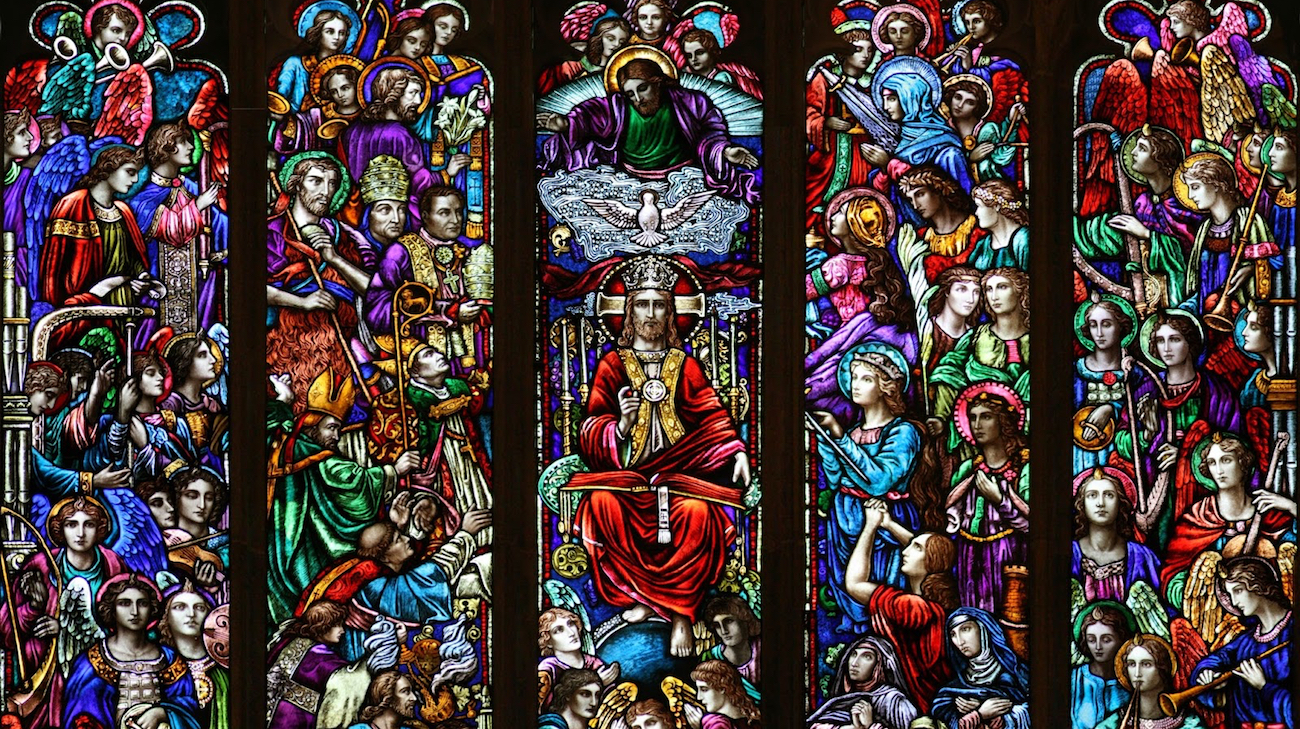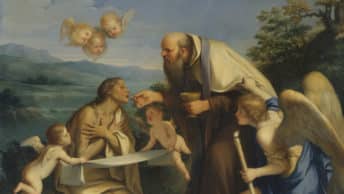In his book, A Short Introduction to the Apostle’s Creed, author Bruno Forte wrote that “the Church is the communion of saints. In the first place, it means having part in the Holy One, the sanctifying Spirit. In the second place, since this communion is brought about through listening to the Word of God and joining in the Sacrament, the Church is communion sanctorum, communion with the holy reality (the sancta). Finally, the baptized, enriched with the manifold gifts of the Spirit directed to the common good, constitute the communion of saints (communio sanctorum in the personal sense), the people made up of persons linked together and in contact with the Divine Counselor.” (pp. 85)
The Servant of God, Fr. John Hardon, S.J., described three states of the Church: “First, the Militant on earth are called to foster the memory of the saints in heaven, invoke them, and imitate their virtues. Second, the Suffering in purgatory. And third, the Triumphant in heaven, whereby the saints in heaven intercede for persons on earth and in purgatory.” (The Faith, 1995, pp. 96) In his work on the Second Vatican Council, Fr. Austin Flannery, O.P., provides the mission of such communion: “Exactly as Christian communion among pilgrims brings us closer to Christ, so our communion with the saints joins us to Christ, from whom as from its fountain and head flow all grace and life of the people of God itself.” (Vatican Council II- Revised Translation in Inclusive Language, Austin Flannery, O.P., 1995, pp. 76)
In the Apostle’s Creed, the Church professes a belief in the Communion of Saints. This communion expresses the unique unity present within the Catholic Church. It is through Christ himself, the primordial sacrament, that we are given the Church—His instrument of salvation and redemption. As such, our participation in it [the Church] deepens our communion with God and promotes the unity of the entire human race.
A priest once reminded me that during the Eucharistic sacrifice, the altar becomes the focal point of the universe. For it is there that the Church, on earth and in heaven, become one in giving praise to the Father. Through Christ and the Holy Spirit, we join ourselves to the heavenly reality for which we strive. By the celebration of the Paschal Mystery, we offer, through the Church, thanksgiving and praise to the Father. But we also offer something else: the gift of our own lives. And this, of course, is something personal that only we may give. The great theologian, Hans Urs von Balthasar, once described this in the following way: “What you are is God’s gift to you, what you become is your gift to God.”
For most relationships, greater intensity of dialogue brings about deeper understanding and appreciation for one another. The same is true of our relationship to the Communion of Saints. As members of the Militant on earth, we are called to engage in dialogue (prayer) with those in purgatory and heaven. Why? Because in Christ, all are alive! As a scriptural backstop, may you consider these words from St. Paul: “For as by a man came death, by a man has come also the resurrection of the dead. For as in Adam all die, so also in Christ shall all be made alive.” (1 Corinthians 15:21-22) Therefore, this beautiful and mysterious communion strengthens our relationship with one another, assists in our trials, and brings us to a greater knowledge of the mystery of faith.
Years ago, just prior to Sunday Mass, I was informed that a dear friend had suffered a heart attack and passed away. After hearing this news, I was distraught but nevertheless decided to attend Mass. My decision turned out to be a wise one. For within that liturgy, the following scripture was proclaimed: “Now if Christ is preached as raised from the dead, how can some of you say that there is no resurrection of the dead? But if there is no resurrection of the dead, then Christ has not been raised; If Christ has not been raised, then our preaching is in vain and your faith is in vain.” (1 Corinthians 15:12-14)
Now given that the Holy Spirit prepares us to receive the Word of God, it follows that without the Spirit, we cannot enter into its mystery. On that Sunday, I felt deep communion with my deceased friend, and especially that he was at peace. Absent the amazing grace of God and communion of saints, my heart, to hearken the words of St. Augustine, would have been restless.
In a special way, the Communion of Saints surrounds us. For in our remembrance of the saints in heaven and holding them up as possibilities for our own lives, they assist us in doing the will of the Lord. This is why the Church calls us to invoke them and imitate their virtues. As instruments of good works sent down from heaven, may they provide us with example so that we may lead others to Christ.





